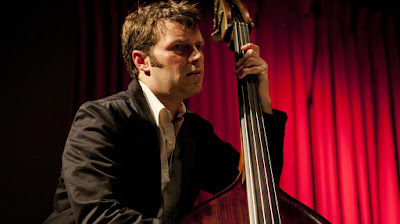
05-11-2019 JAZZ:MiX # 33 jazz tracks on the the JAZZ_line 2010-2000 # Lonnie Smith, Portico Quartet, Todd Sickafoose, Charlie Hunter, Kazumi Watanabe New Electric Trio, Marcus Miller, Paul Motian, Two Banks of Four, Weather Report, Chuck Bergeron, Patricia Barber
J A Z Z M U S I C
if you want excitement PRESS SHUFFLE!
LISTEN THE PLAYLIST ON DEEZER.COM
JAZZ_line The player always plays the latest playlist tracks. / A lejátszó mindig a legújabb playlist számait játssza.
2010-2000
Virtuosic funk-jazz organist whose teaching career limited his recording output. Organist Lonnie Smith has often been confused with keyboardist/pianist Lonnie Liston Smith -- and, in fact, more than a few retailers have wrongly assumed that they're one and the same.
Dr. Lonnie Smith
Spiral 5:55
Mellow Mood (Jimmy Smith) 5:12
Frame for the Blues (Slide Hampton) 8:52
from Spiral 2010
Dr. Lonnie Smith shows no signs of slowing down. Spiral is is his fifth studio album since 2003, and his fourth for Palmetto. Produced by Matt Balitsaris, Smith's trio includes guitarist Jonathan Kreisberg and drummer Jamire Williams. The program is a solid set of jazz nuggets, an original, and a couple of ballad standards. Things lead off with Jimmy Smith's "Mellow Mood," which is relaxed but hardly what the title suggests. Smith is in prime soul-jazz mode here, paying tribute to his mentor by swinging hard on the melody. Another nice touch is the reading of Slide Hampton's "Frame for the Blues," a smoky, nocturnal slow burner that features a fine solo by Kreisberg... Spiral puts the full range of Smith's powers as an interpreter and improviser on display. This grooving trio makes it all sound easy, though nothing could be further from the truth.
Portico Quartet
Paper Scissors Stone (Portico Quartet) 5:27
Isla (Portico Quartet) 5:09
The Visitor (Portico Quartet) 5:29
from Isla 2009
...One of the strengths of Isla is that the hangs aren't treated like exclamation marks; their particular attributes have become more fully integrated into the group sound. The basic Portico paradigm has hang players Nick Mulvey and Duncan Bellamy, who also plays kit drums, working in tandem with double bassist Milo Fitzpatrick to produce interconnecting layers of beats and melodic motifs. Some might call this "trance," but there's too much evolution going on to merit that generic description. Saxophonist and (less is more) loopist Jack Wyllie rides the waves, stating most of the themes and taking most of the formal solos... Melodies are attractive and catchy. Rhythms are insistent. Improvisation is to the fore. Isla is the nuts.
Bassist, bandleader, and composer Todd Sickafoose probably performs before his largest live audiences when backing alternative folk singer/songwriter Ani DiFranco, and he can be heard on such DiFranco CDs as 2005's Knuckle Down and 2006's Reprieve. Much of his musical career has been devoted to the avant-garde and creative jazz world, however, and he has garnered considerable acclaim as a jazz sideman as well as leader of his own Todd Sickafoose Group.
Todd Sickafoose
Future Flora (Todd Sickafoose) 6:26
Bye Bye Bees (Todd Sickafoose) 10:42
Paper Trombones (Todd Sickafoose) 6:58
from Tiny Resistors 2008
The inventive bassist/composer Todd Sickafoose has been plying his trade as a sideman while occasionally venturing forth as a bandleader in the progressive jazz world. With Tiny Resistors, he's hitting for a high average in presenting original music with a dramatic flair while playing not just the bass. Overdubbing keyboards, accordion, mallet instruments, and the electric bass guitar, he orchestrates charts with many layers for a large ensemble that features electric guitars, brass, and some woodwinds... A walking-to-jogging pace, serious to whimsical, identifies "Future Flora" (great title!) as the amplified guitars of Adam Levy and Mike Gamble with Sickafoose on the Wurlitzer organ shush along with Allison Miller and the horns of trumpeter Shane Endsley and trombonist Alan Ferber in a 10/8 rhythm... "Bye Bye Bees" and "Pianos of the Ninth Ward" include both Andrew Bird (violin) and Ani DiFranco (wordless vocals); the former nearly 11-minute track has a polyrhythmic base with handclapping, whistling, and song sounds in tandem with the horns, while the latter is a somber post-Katrina waltz with Sickafoose on piano, the guitars, and an electric ukulele from DiFranco... A rustic old New Orleans blues rhythm centers the muted brass during "Paper Trombones," a bit dour and holding a mystery train-like aura, with the vibes and bass playing of the leader conducting the trip. A wonderfully spacious intro with minimalist bells, vibes, and celeste overdubs turns probing, moving forward into dense terrain on the title selection, with Miller's busy drumming as a fulcrum.













